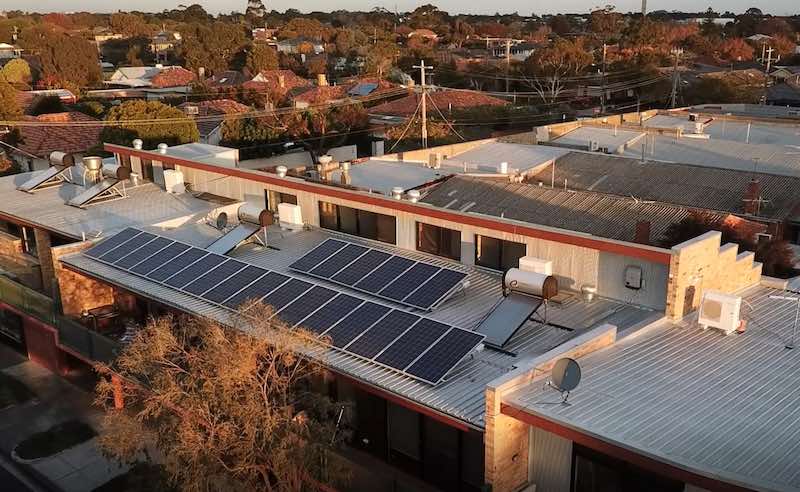
A Melbourne pilot project that aims to install shared solar and battery storage systems in three multi-tenanted buildings has won nearly $1 million in grant funding from the Victorian government.
State energy minister Lily D’Ambrosio announced the $980,000 grant for the Ovida Community Energy Hub project on Monday, as part of her government’s Microgrid Demonstration Initiative, launched in 2017.
The consortium behind the $2 million project includes the relatively new energy market player Ovida, shared solar start-up Allume Energy, distribution company Jemena, RMIT and the Moreland Energy Foundation.
The project will install solar PV and battery systems in three as-yet unnamed multi-tenanted commercial and residential buildings, to help cut energy costs for around 650 customers – all up it is expected to generate 5000kWh of renewable energy and support 11,000kWh of energy storage.

The project will, presumably, use the energy sharing technology of Allume, which earlier this year switched on its first commercial shared solar system, at a mixed residential and retail building in the Melbourne Bayside suburb of Highett.
As we reported here, that 7.2kW system is delivering cheap PV power to five apartments, a baker, a hair salon, and an occupational therapist, using Allume’s mix of software and hardware, called SOLSHARE.
The technology – essentially contained within a small box – is designed to work within the building’s existing metering infrastructure, or “behind the meter,” to allow solar to be distributed and billed to individual apartments.
Allume worked with Ovida on that project, too, as financial backers with benefits – Ovida also happen to have obtained a electricity retail exemption from the Australian Energy Regulator for all states and territories except Western Australia and the Northern Territory.
Their involvement allowed the rooftop PV system to be installed at no upfront cost through a 10-year “roof licence” with the landlord or the owners corporation.
Allume then charges the tenants for the solar electricity on a “pay for the power, and not the panels” basis, through a power purchase agreement, at a locked-in rate of 30 per cent less than the retail electricity price.
“Traditionally solar arrangements in multi-tenanted apartment blocks have been all or nothing – meaning all residents had to invest in and use the system for it to work,” said Ovida’s Paul Adams, in comments this week about the new Melbourne project.
“We know this can be a challenge because apartment blocks often include long-term residents, owners, and short-term occupants who each have different energy needs and expectations.
Adams said the new Melbourne trial was also aimed at tackling energy affordability, by providing the panels, battery and infrastructure to customers with no up-front costs.
“This removes inequality in the market place and by trialling the microgrid technology, we can explore how companies can viably supply such solutions – again, with no financial commitment required from homeowners,” he said.
In a statement on LinkedIn, Allume Energy said it was proud to be a part of the team effort, which would “demonstrate the application of microgrids in multi-tenanted buildings such as apartments and shopping centres.”
As we have reported on One Step, the push to extend the benefits of rooftop solar to those without the means – or the roof – to install it themselves is quickly giving rise to a new breed of start-ups –
SunTenants, Allume, Enova, and Power Ledger, to name a few.
Governments are also stepping into the breach, with a particular focus on extending access to solar and other energy saving technologies to rentals and lower income households.
The Victorian government’s Microgrid Demonstration Initiative grant program is providing $10 million to support eight state-wide microgrid projects totaling over $37 million in value.
The idea is to give small networks of electricity users a local supply of cheap and reliable power that can function independently of the electricity grid, using renewable energy as the primary generation source.
Separately, the government last week launched a $3 million grant program to support the development of a renewables based microgrid project in the Latrobe Valley.
“Microgrid projects are part of our plan to drive down energy prices, reduce emissions and create a pipeline of investment in renewable energy,” D”Ambrosio said on Monday, in comments about the Ovida project.
“This initiative will allow more households and businesses in multi-tenanted buildings to take control of their energy bills.”
The Victorian Greens, meanwhile, have launched their own renter’s solar power policy, ahead of the November state election, giving tenants of private and public housing, and apartment owners, access to solar gardens.

Sophie is editor of One Step Off The Grid and editor of its sister site, Renew Economy. Sophie has been writing about clean energy for more than a decade.

